- Home
- Iris Murdoch
The Time of the Angels Page 4
The Time of the Angels Read online
Page 4
Pattie really knew the falseness of this dream. She knew it as with the passing of time she realized that her bond with Carel was now stronger than ever. She was not left to herself. The physical connection between them still cobwebbed the house with its electric silk. Carel who had once danced with her, danced alone now to the Swan music, a shadowy figure moving in the darkness of his room, whose door for some protection he usually left a little open; but she felt sure that he danced for her, that he was her, dancing. She was aware of him and he was aware of her. By other means she was his mistress still. And Carel seemed to need her more than before. They did not talk a great deal, but they had never talked a great deal. They existed together in a constant sort of animal communion of looks and touches and presences and half-presences.
It was in this closeness that Pattie apprehended at last something like a great fear in Carel, a fear which afflicted her with terror and with a kind of nausea. It seemed to her now that, for all his curious solitary gaiety, she had always seen him as a soul in hell. Carel was becoming very frightened and he carried fear about with him as a physical environment. His fear had some curious manifestations. He saw animals in the house, rats and mice, when Pattie was sure there were none. He complained of a black thing which kept whisking out of sight. Pattie was aware that such imaginations could come from drinking, only Carel did not drink. In any case Pattie knew that what frightened Carel did not belong to the material world even in the sense in which pink elephants did.
And then there had come, quite unexpectedly, the move to London. This had been terrifying in prospect, terrifying in the event. Pattie realized then how much her weird world depended on the solid simplicity of its surroundings for its semblance of a decent reality. Like the Hindu mystic who used to conceal the supernatural glowing of his body in a closely wound sheet, so Pattie would don her three-quarter length coat and put on her red velour hat and her suede gloves to visit the supermarket. It had mattered to her that she shopped in certain shops, gossiped with certain women, went to a certain picture house, had her hair straightened at a certain hairdresser’s where there were certain magazines. There was a whole reassuring domain where Pattie was known in her ordinariness and where the lurid purple glow was veiled. There had once been a trifle of speculation about her and Carel, but it had died down and no one had been unpleasant to her. Pattie existed in this everyday world and had her title there. She had heard a woman utter it one day as she was coming out of church. “Who is that?” “The coloured servant at the Rectory. They say she’s a treasure.”
Pattie was afraid that, like some relic which turns out in the end to be composed of dust and cobwebs, her existence with Carel might suddenly fall to pieces if they were removed to another place. In her agitation all difficulties seemed equally charged with menace. Where should she go now to have her hair straightened? And where would she ever find a charwoman as good as Mrs Potter? And how on earth in the extraordinary desert in which the Rectory seemed to be situated was she even to feed Carel? Eugene Peshkov was still unable to procure any carrots. Eugene, big, friendly, calm and reassuringly unamazed by the phenomenon of Pattie, was in fact the only consoling feature in the situation.
The fourth day had brought no diminution of the fog. It was dark even at noon, and the house remained exceedingly cold even though Eugene assured her that the central heating was in working order. Pattie had shut Mrs Barlow out and forgotten her. And now the front door bell was ringing again.
Pattie opened the door a crack and saw outside Marcus Fisher, who had already called several times, accompanied by a woman whom Pattie vaguely recognized. The woman spoke.
“Good morning, Pattie. I am Miss Shadox-Brown, you remember me, I visited Muriel at the place where you lived before. I’ve come to see her now, if you please. And Mr Fisher has come to see the Rector and Elizabeth.”
Pattie put her knee behind the door. “I’m afraid Miss Muriel is out. And the Rector and Elizabeth are seeing nobody.”
“I’m afraid we can’t quite take that for an answer, Pattie,” said Miss Shadox-Brown, moving up on to the top step. “Supposing you just let us in for a minute and we can talk about it more sensibly inside, eh?”
“I’m sorry,” said Pattie. “We aren’t having any visitors today.” She shut the door flatly against Miss Shadox-Brown’s nose. A sturdy foot, which had begun to insert itself in the crack of the door, narrowly escaped being crushed.
Pattie turned back into the dark hall. Frère Jacques, Frère Jacques, dormez-vous? She caught at the white flash of the paper dart and crumpled its crisp wings in her hand. She looked up at her master, tall and dense in his black cassock as a tower of darkness. An underground train rumbled beneath them, possibly bearing Pattie’s father about his daily work.
CHAPTER FOUR
“MURIEL.”
“Yes.”
Requested when very small to call her father “Carel” and finding herself unable to do so, Muriel had been thus early deprived of the ability of call him anything.
“Could you come here for a moment?”
Carel always said “Come here” as if his presence were a definite locality. There was also a certain menace in the phrase as if a blow were to be expected.
Muriel stood uneasily in the doorway. She feared her father.
“Come nearer, please.”
She moved into the study. The books, shifted now from the hall, covered the black horsehair couch and half of the floor with an indistinct dark fungus. A single adjustable reading-lamp revealed upon the desk a circle of scored red leather and a glass of milk, and showed beyond and above, more dimly, Carel’s handsome face, always seeming to Muriel a trifle glazed and stiffened. The troll King.
“I was wondering what arrangements you proposed to make, Muriel, about finding yourself employment in London.”
Muriel thought quickly. She had no intention of telling her father the truth, which was that she intended to remain unemployed for six months and devote all her time to writing poetry. Muriel, a composer of verses since childhood, had long been tormented by the question: am I really a poet? In these six months she would find out, one way or the other, forever. She would give a last chance to the demon of poetry. After all, the only salvation in this age was to be an artist. At the moment she was engaged on a long philosophical poem, in the metre of the Cimetière Marin, of which she had already composed forty-seven stanzas.
“I’ll start looking round,” she said.
“That’s right. You should find no difficulty in obtaining a secretarial post in the city.” Carel said “obtaining a post” and not “getting a job". It was part of a bureaucratic manner which, Muriel noticed, he kept reserved for her.
“I’ll look around.”
“Are you just going in to Elizabeth?”
“Yes.”
“That’s right. I think I hear her bell ringing now. Go along then.”
As Muriel reached Elizabeth’s door she heard the voice behind her calling softly “Pattikins". She frowned, knocked carefully upon the door and then entered.
“Hail to thee.”
“Hail to thee.”
Elizabeth was sitting on the floor, smoking a cigar and engaged on the enormous jigsaw puzzle which had occupied the girls now for nearly two months. It had been brought to London in its half-finished state precariously in the boot of the hired car.
“These bits of sea are so difficult, all the pieces look alike.”
The picture on the puzzle represented sailing-ships in a sea battle. The girls had not been able to identify the battle.
Elizabeth continued to smoke and to fiddle with the pieces, while Muriel sat down against the mirror of the French wardrobe and watched. She liked to see the thick brown cylinder of the cigar twisting between those thin paper-white fingers.
Elizabeth was in full beauty. Since her illness she always dressed simply, in black trousers and a striped shirt, and yet continued to have the slightly exotic feathered appearance of a favourite page.
Her straight pale yellow hair fell in even pointed locks to her shoulders, metallic and decorative as a mediaeval head-dress. Her long narrow face was pale too, seeming sometimes to be almost white, but with the golden white of a southern marble. Her indoor life had bleached her, like a darkened plant, yet there was radiance in the pallor. Sometimes her whole head seemed to have been whitened as if a very cold light shone upon it. Only her large eyes, a dark grey-blue, glowed more richly, as if one should see a stormy sky through the empty eyes of a statue.
“Sorry to ring. I was just bored. Not a nuisance?”
“Not a bit.”
“Any news là-bas?”
“Nothing special. That awfully nice Russian man has brought us some more grub. He’s cottoned on at last to the fact that Pattie and I are separate institutions.”
It was a matter of pride to Muriel not to let Pattie serve her. Pattie rejoicing at Clara’s death had engendered a hatred in Muriel which time had merely dulled into a habit. When she was younger she had made one or two formal attempts to forgive Pattie, but there is no grace-aided sacrament of forgiveness. She pitied the pathetic brown animal sometimes, that was all. She had also tried to perceive her father’s fault. But some mechanism of her universe made Carel’s fault invisible. What she did grimly observe was that her father seemed to get some sardonic amusement out of the feud between his servant and his daughter.
“You’ve lost my place, damn you.”
Muriel had automatically closed the volume of the Iliad which lay beside her on the floor. Knowledge of Greek hung upon Elizabeth as an extra grace. Muriel regretted now that she had not learnt Greek. She regretted that she had not gone to a university. She felt old and regretted many things.
“Sorry. I’m a bit nervy. It’s like being besieged here just now. The fog’s as thick as ever.”
“I know. Rather exciting actually. I haven’t even bothered to draw the curtains back. It might as well be night.”
Elizabeth’s new room, brightly lit with several lamps, had already begun to resemble Elizabeth’s old room. It was, like the latter, L-shaped, with Elizabeth’s bed in the recess, partly concealed behind a Chinese screen. Turning her head a little, Muriel could see in the mirror the very end of the bed. The sheets were trailing untidily, but the effect was of a nest of feathery silky stuffs composing a sort of Oriental couch. A long bookcase, already filled and ordered, occupied the nearer wall. Elizabeth’s work-table, with her little wireless and her typewriter which she called “the dog", stood between the wardrobe and the door. Facing the fireplace where a sulky fire was burning, and now supporting Elizabeth’s back as she rested from the puzzle, was the chaise-longue in pink velvet which Elizabeth had insisted on having, and which Carel had bought for her with care and expense, when she had first become ill. “If I’m going to be an interesting invalid I must have a chaise-longue,” Elizabeth had said then. Muriel admired, was always admiring, her courage and the almost uncanny cheerfulness with which she endured her narrow lot.
“What did Carel want? I thought I heard him calling you.”
It still gave Muriel a slight shock to hear her cousin call him “Carel". This she had done, and so addressed him too, from an early age with every naturalness. The girls never discussed Carel except at the level of speculating whether he might not be carried off to hell one day by the devil in person.
“He asked me about getting a job.”
“You didn’t tell him about the poetry jag?”
“No.”
Elizabeth never asked to see Muriel’s poetry, and when Muriel occasionally showed her something she made small comment. Muriel, who would have been very upset indeed by an adverse criticism, still hoped for a little more encouragement.
In these days Muriel felt in an almost physical way the altering proportions of her relationship with Elizabeth. The five years which divided them had signified at different times different things. Elizabeth had always been somehow the delicate pure heart of the household, its kernel of innocence. No shadow had ever seemed to fall upon the gaiety of the orphan child, a gaiety curiously invincible and purged. Even Pattie had loved her. Muriel had felt both gauche and tenderly protective as Elizabeth pulled her impetuously forward by the hand through the years of childhood. Muriel, who had a solid and even relentless confidence of her own, had naturally cast herself as Elizabeth’s teacher. Elizabeth had been apt, affectionate and loyal. Now of late Muriel had felt the balance shifting, and felt her five years’ lead diminish. As a cultivated educated person her cousin was nearly her equal, and Muriel now intuited in the almost grown-up Elizabeth a strength of character not inferior to her own. Intuited, because this power was never deployed against her, scarcely even shown in her presence. Elizabeth still acted the gay dependent child for Muriel’s benefit, and indeed for Carel’s, but now with a kind of spontaneous feigning. What had been, what still seemed, so adorably soft and silky now showed an occasional glint of steel.
This quiet hardening had, to Muriel’s mind, completed Elizabeth’s beauty. The pale face was sadder, seemed stretched a little longer, as if some authoritative structure had been scarcely perceptibly introduced behind. The dark blue-grey eyes were more veiled now, looked out of a more consciously inhabited, more formidably defended fane. Muriel had always accepted that Elizabeth was “the pretty one", and there was no shadow of envy in her admiration of her cousin’s good looks. Muriel, who never tended in any way to underestimate herself, knew that she was not unattractive. Her face in fact notably resembled Elizabeth’s, but without the extreme pallor and distinction of feature. Her hair, which she cut short in a boyish way, was a stripy golden brown and her rather narrow eyes were a dark and speckled blue. Muriel did not doubt her own handsomeness. But here she was content to be good and to delight in Elizabeth as excellent.
With things of the mind of course it was different. Elizabeth was bright rather than reflective, a clever but hardly a creative mind. Elizabeth had rapidly mastered Greek, and her Latin was now better than Muriel’s. But Muriel had approved and ratified Carel’s decree, issued partly on grounds of health, that Elizabeth should not go to a university. Elizabeth had been unmoved, confident, as Muriel had been at that age, in her power to educate herself, and Muriel had been pleased to be able to continue to form and inform a mind for whose future development she still had detailed plans. Muriel knew that she must continue, where her cousin was concerned, to be the boss; and indeed Elizabeth had never been, and she was sure could never be, a menace to her consciousness. There had never been anything approaching a conflict of wills between them. Their relationship, as they had so often had occasion to exclaim to each other, was remarkable, was perfect.
Muriel worried sometimes about the degree of seclusion which Elizabeth seemed to accept as natural. In the Midlands they had had a small circle of friends whom the two girls had invariably regarded as their inferiors, teasing and bossing them in their presence and mocking them in their absence. Any young person other than their two selves was sooner or later voted “awfully dim". In fact they treated their friends as a pair of sophisticated young princesses might have treated the children of their servants. Better company might perhaps be hoped for in London, but it would take a long time to find suitable friends for Elizabeth. Carel never made any attempt to procure her society, and Elizabeth herself seemed curiously indifferent to her solitude. Muriel had watched the adolescent Elizabeth a little anxiously for signs of interest in boys, for any incipient clutching at the other sex, but Elizabeth had done no more than laugh at her few male acquaintances. Muriel had listened in vain for any inward echo of a need, and she did not think there was in the crippled girl’s acceptance of her present life a single grain of despair. Only of late, and in an uncanny silence, she had felt in Elizabeth the growth of a passionate nature.
Muriel, long ago convinced that she herself was exceptional, had lately begun to assume that she was not destined for any conventional love-life. Muriel was not only still a virgin, she was not even worrie
d about it. She had never met a man of her own age who did not seem a very small object compared with herself. She had occasionally become attached to older men in what she thought of as a silly sentimental way. She had been in love with her Latin master and with a senior partner of the firm where she worked. Unrequited, and indeed unnoticed, her affections had died quiet deaths. She did not think that the great convention of passionate love was for her. She would be sombrely content with the solitary destiny of the artist and thinker. And of course it was also true that the energy of her heart was perfectly distributed and used up in the system formed by her relationship with Elizabeth.
But for her cousin, Muriel perceived with a realism whose painfulness she found oddly invigorating, it might well prove in time to be different. Elizabeth’s fate was not, like Muriel’s, marked as the exception. One day Elizabeth would move into the happiness of ordinary life as into her birthright. She was far too delicious to be endlessly wasted in the dark unvisited cavernlike environment which Muriel’s father increasingly created round about himself and in which Elizabeth was indeed the only centre of light. Of course, Muriel had thought of taking Elizabeth away; at least the thought had visited her, but had always been turned off as somehow improper and premature. There was a point of fragility, not in her relation with Elizabeth but somewhere in the situation, which would not brook such a violence. Elizabeth after all had paid the price of her seclusion. She was not yet ready to face the world. But it was impossible that one day her prince would come. Or rather, should it ever become clear that a prince was required Muriel was determined to select and train him herself. She did not envisage marriage as the loss of Elizabeth. After these many years Elizabeth could not be lost. Between them they would manage Elizabeth’s husband.

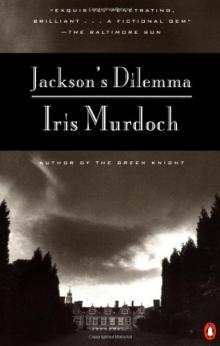 Jackson's Dilemma
Jackson's Dilemma The Flight From the Enchanter
The Flight From the Enchanter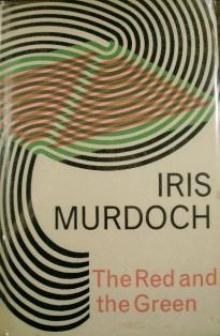 The Red and the Green (Vintage Classics)
The Red and the Green (Vintage Classics) A Severed Head
A Severed Head The Black Prince
The Black Prince The Nice and the Good
The Nice and the Good The Unicorn
The Unicorn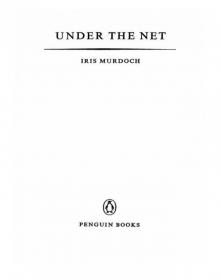 Under the Net
Under the Net The Italian Girl
The Italian Girl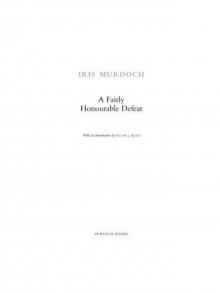 A Fairly Honourable Defeat
A Fairly Honourable Defeat An Accidental Man
An Accidental Man A Word Child
A Word Child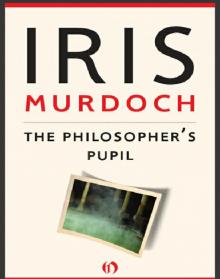 The Philosopher's Pupil
The Philosopher's Pupil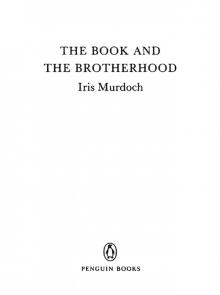 The Book and the Brotherhood
The Book and the Brotherhood The Good Apprentice
The Good Apprentice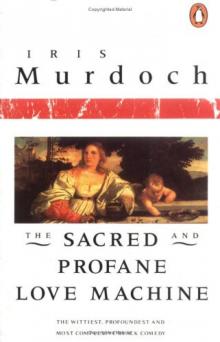 The Sacred and Profane Love Machine
The Sacred and Profane Love Machine The Bell
The Bell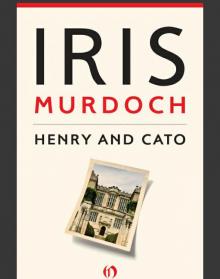 Henry and Cato
Henry and Cato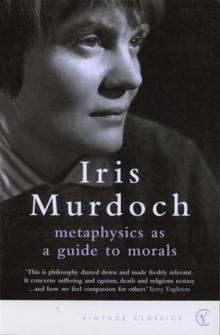 Metaphysics as a Guide to Morals
Metaphysics as a Guide to Morals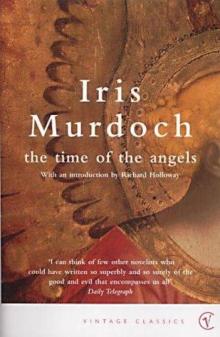 The Time of the Angels
The Time of the Angels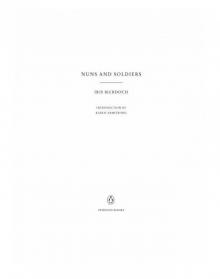 Nuns and Soldiers
Nuns and Soldiers The Green Knight
The Green Knight The Sea, the Sea
The Sea, the Sea Sartre: Romantic Rationalist
Sartre: Romantic Rationalist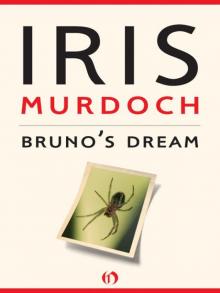 Bruno's Dream
Bruno's Dream An Unofficial rose
An Unofficial rose Sartre
Sartre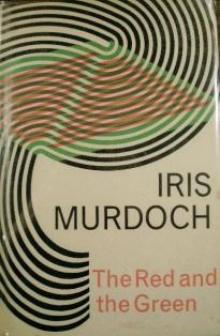 The Red and The Green
The Red and The Green